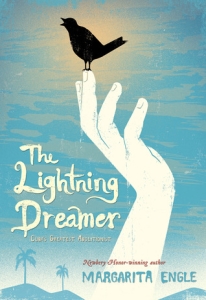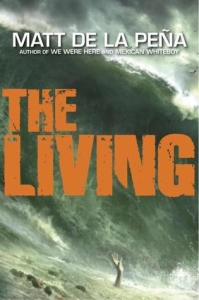Reviews of the 2014 Belpré Author Award winners
Winner: Yaqui Delgado Wants to Kick Your Ass by Meg Medina
(Candlewick)
A move to a new neighborhood in Queens means a new high school for almost-
sixteen-year-old Piddy (short for Piedad) Sanchez.
 Winner:
Winner: (Candlewick)
A move to a new neighborhood in Queens means a new high school for almost- sixteen-year-old Piddy (short for Piedad) Sanchez. Instead of a welcoming committee, she gets word that someone she doesn’t even know has it in for her. Yaqui Delgado turns out to be one of those girls Piddy’s mother calls “nobodies,” or, as Piddy explains it, “They’re her worst nightmare of what a Latin girl can become in the United States. Their big hoop earrings and plucked eyebrows…their tight T-shirts that show too much curve and invite boys’ touches.” Yaqui may think she’s tough, but it’s Piddy and some of the other female characters, namely Piddy’s mother and her mother’s flamboyant best friend Lila, who make more lasting impressions. Medina’s setting stands out as well, especially her portrayal of the bustling Latina-owned beauty salon, Salon Corazon, where Piddy works on weekends, folding towels and sweeping up hair. It’s here where Piddy overhears unsettling gossip about her mother and father, a man Piddy has never met — gossip that makes her question whether her mother is as virtuous as she purports to be. As the bullying intensifies, so do Piddy’s fear and lack of self-worth, to the point that she’s soon spending more time retreating from her life than living it. Is it easier to give up and become a “nobody,” or should she fight back? Teens will identify with Piddy’s struggle to decide. CHRISTINE M. HEPPERMAN
 Honor: The Lightning Dreamer: Cuba’s Greatest Abolitionist by Margarita Engle
Honor: The Lightning Dreamer: Cuba’s Greatest Abolitionist by Margarita Engle(Harcourt)
“So sorry that I am not / the sort of daughter / my mother can love,” laments Tula. At thirteen, she wonders “how many slaves / Mamá will buy with the money / she gains by marrying me to / the highest bidder.” Mamá herself twice thwarted her wealthy father by marrying for love; now, however, she schemes to regain her inheritance through her unwilling daughter. Tula’s love is language — the banned words of the poet Heredia “refusing to accept / the existence of slavery” and her own words, “I don’t want to be a man, / just a woman / with a voice.” Loosely based on the early life of the Cuban novelist and human rights advocate Gertrudis Gómez de Avellaneda (1814–73), this novel in verse follows Tula for the three years that take her into open rebellion and its first consequences; there’s also a glimpse of her living independently, as a poet, seven years later. Tula’s desperate need to write and her struggle for self-determination resemble that of Pablo Neruda in Pam Muñoz Ryan’s splendid The Dreamer (rev. 3/10). Brief, lyrical observations from others — Mamá, a beloved brother, the nuns who nurture Tula’s creative gift — add dimension to Tula’s own voice and the nineteenth-century Cuban setting. “Words / can be as human / as people, / alive / with the breath / of compassion,” says the eloquent former slave Caridad. In Engle’s able hands, they are just that. A historical note sorts fact from fiction and samples Avellaneda’s poetry. JOANNA RUDGE LONG
 Honor: The Living by Matt de la Pena
Honor: The Living by Matt de la Pena(Delacorte)
Shy Espinoza's summer job on Paradise Cruise Lines is, literally, a disaster. A series of catastrophes befall the cruise and eventually threaten civilization as he knows it; Shy finds himself on a life raft in the Pacific Ocean with a racist "spoiled-ass blond chick." Readers wanting a fast-paced survival story with plenty of action won't mind the over-the-top plot. DEAN SCHNEIDER
 Honor: Pancho Rabbit and the Coyote: A Migrant's Tale by Duncan Tonatiuh, illus. by the author
Honor: Pancho Rabbit and the Coyote: A Migrant's Tale by Duncan Tonatiuh, illus. by the author(Abrams)
Because of a drought, Pancho Rabbit's father heads north for work. When he doesn't return, Pancho goes looking for him, guided by Señor Coyote. What begins as a light allegory becomes a darker tale. Tonatiuh effortlessly employs Spanish words, and folk art–like illustrations complement the story's origin. The author's note on immigration is geared to an older audience. Reading list, websites. Glos. BETTY CARTER
RELATED
RECOMMENDED
ALREADY A SUBSCRIBER? LOG IN
We are currently offering this content for free. Sign up now to activate your personal profile, where you can save articles for future viewing.







Add Comment :-
Be the first reader to comment.
Comment Policy: